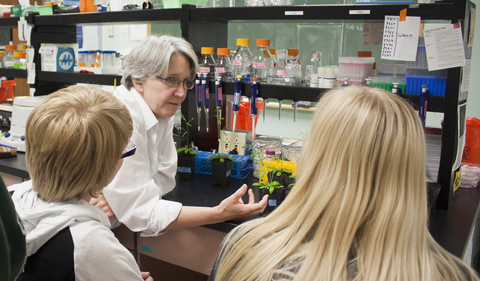Among the 31 space biology research proposals NASA announced on May 29 for immediate implementation is an experiment with Arabidopsis seedlings by Dr. Sarah Wyatt, Professor of Environmental & Plant Biology at Ohio University
NASA will fund the “Research Opportunities in Space Biology” proposals to help investigate questions about how cells, plants and animals respond to changes in gravity. Nine flight experiments will be conducted on the International Space Station, 14 ground-based studies are designed to lead to the development of hypotheses to be tested on space station, and 8 proposals to collect preliminary data by investigators new to space biology. Selected proposals are from 21 institutions in 13 states and will receive a total of about $14.9 million over a one- to four-year period. Scientific and technical experts from academia and government reviewed the proposals.
Wyatt’s experiment is an International Space Station flight experiment on “Proteomics Analysis Of Arabidopsis Seedlings In Microgravity.”
“This is a big adventure. Just figuring out what it takes to do a spaceflight experiment is monumental: the acronyms, the hardware, the paperwork, refining and detailing the experimental parameters, the timeline, the pressure,” Wyatt says. “It’s not like we can just redo this if something doesn’t work. It’s a steep learning curve! But really exciting. Our stuff is going to fly!”
It’s also a great opportunity for the graduate and undergraduate researchers in Wyatt’s lab, some of whom will be able to go to the Kennedy Space Center.
“During the definition phase of the project, we counted a bazillion seedlings,” says Marilyn Hayden ’13, now a graduate student working in the Wyatt Lab. “I’m definitely looking forward to seeing these guys fly. Can’t wait to get to Kennedy.”
Read more about their work at How Do They Know Which Way Is Up?
Experiment Abstract: The space flight environment provides a unique environment to understand how gravity informs plant growth, development and physiological processes. The central objective of this study is to determine what proteins are differentially expressed during space flight in developing Arabidopsis seedlings. A body of research has evaluated the differential gene expression on space flight vs ground controls, but gene expression provides an indirect measure of what proteins are expressed. Genes may be transcribed but the transcripts degraded, or translated proteins may be regulated through post translational modifications. Our hypothesis is simple: Some components of plant physiology that are informed by gravity are regulated by post transcriptional or post translational mechanisms. Proteomic analysis is the best/only method to identify these components. We propose to use BRIC-PDFU hardware on a Rapid Turn-Around Space Flight Experiment to gain insights into differences in protein profiles between Arabidopsis seedlings grown during space flight and ground based controls. Arabidopsis seedlings will be germinated, grown and tissues fixed on orbit. Once returned to Earth, total protein will be extracted, labeled with iTRAQ reagents and analyzed for differences in protein profiles. These data will complement the gene expression data currently available from space flight experiments and also provide novel insights by supplying data on differences in post-transcriptional regulation. They will also provide a foundation to generate additional hypotheses as to the mechanisms involved in gravity perception/response in plants.



















Comments